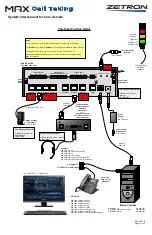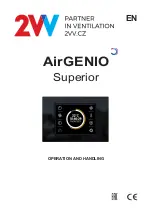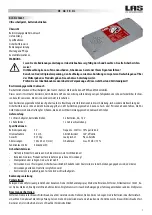
Standard Components
Operation
The Rate-of-Flow Control Automatic Control Valve (ACV) is designed
to automatically limit flow rate to a constant, adjustable, maximum. It
is controlled by a normally open, differential control pilot designed to:
1) Open (allowing fluid out of the main valve cover chamber) when the
differential pressure across the orifice plate is below the adjustable set
point, and, 2) Close (allowing fluid to fill the main valve cover cham-
ber) when the differential pressure across the orifice plate is above the
adjustable set point. A decrease in differential pressure causes the
valve to modulate towards an open position, increasing flow rate. An
increase in differential pressure causes the valve to modulate towards
a closed position, decreasing flow rate.
The Orifice Plate Assembly should be installed three to five pipe di-
ameters downstream of the Rate-of-Flow Valve, and field connected
with
3/8
" minimum copper tubing in accordance with factory piping
schematic.
Please specify desired flow rate PRIOR to ordering.
1
X
X
X
Y/FC
3
2
4
CLOSES VALVE
OPENS VALVE
FLOW
(AOS)
1 - Main Valve (M100 – Single Chamber)
2 - Rate-of-Flow Control
3 - Adjustable Closing Speed
4 - Orifice Plate Assembly
X – Isolation Cocks
1. Prior to installation, flush line to remove debris.
2. Install valve so the flow arrow matches flow through the line, and gauges to monitor valve inlet and outlet pressures. A Position
Indicator can be installed to provide visual indication of valve position and operation without disassembly.
3. Install isolation valves upstream and downstream of the main valve.
4. Provide adequate clearance for valve servicing and maintenance. Refer to valve servicing dimensions on next page. Avoid installing
valves 6" and larger in the vertical position (main valve stem horizontal). Automatic Control Valves (ACVs) are designed for horizon-
tal in-line installation, with the cover facing up (main valve stem vertical). Slow operation or premature stem and guide wear may
occur if valve is not installed according to factory recommendations. Consult factory for detailed engineering review prior to order-
ing if valve is to be installed other than horizontally in-line.
5. If valve is equipped with a pilot control system, extra precautions should be made during installation to protect the piping circuit
from damage. Only remove the pilot control system from the valve if necessary. Tubing and fittings should be kept clean and
replaced exactly as removed. Consult appropriate hydraulic schematic to ensure proper re-assembly.
6. To accurately set flow rates, either a differential gauge or a flow meter should be installed.
7. Ensure that orifice plate is installed with flow arrow pointed downstream and assure that sense holes are free from obstruction.
8. After installation, vent entrapped air from valve cover and pilot system by following instructions on Technical Bulletin.
Start-up of an automatic control valve requires that proper procedures be followed. Time must be allowed for the valve to react to
adjustments and the system to stabilize. The objective is to bring the valve into service in a controlled manner to protect the system
from damaging over-pressure.
Installation
LFM114 (Globe) Rate-of-Flow Control Valve
2 IOM-ACV-114_6114 2115
EDP# 1917069
© 2021 Watts






























